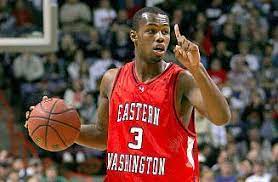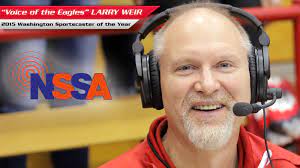Rodney Stuckey only played basketball at Eastern Washington for 2 years but he certainly made the most of his time there, scoring 24.2 PPG while being named conference ROY as a freshman and scoring 24.6 PPG while being named conference POY as a sophomore. After being drafted 15th overall by Detroit in the summer of 2007 he broke his hand during the preseason but bounced back to make the NBA All-Rookie 2nd Team as his team made the Eastern Conference Finals. He played 10 years in the NBA, averaged 12.9 PPG in 612 career games, and shot 82.7 FT%. HoopsHD’s Jon Teitel got to chat with both Rodney as well as Eastern Washington radio play-by-play announcer Larry Weir about Rodney’s great career. Rodney turns 35 today so let us be the last to wish him a happy birthday!
You grew up near Seattle: what made you choose the Eagles? RS: I grew up in Kent. Coming out of high school I was a couple credits short of qualifying but Eastern allowed me to come there and get my academics right under Prop 48. LW: He did not qualify academically right out of high school so he could not accept any offers from Pac-10 schools. He did not want to go the prep school/JC route so he went to Eastern Washington to focus on academics for 1 year. He was a smart kid who just had a bad living situation where school took a back seat to survival. He was an Academic All-American in college and was tremendously bright.
In January of 2006 you scored a school-record 45 PTS (including 23 PTS in the final 8 minutes) and had 5 STL in 32 minutes in a 10-PT loss at Northern Arizona: was it just 1 of those scenarios where every shot you put up seemed to go in because you were “in the zone”? RS: I do not remember it well but I guess you could say that I was in the zone. LW: No: it was just 1 of those situations where NAU did not have anyone who could guard him! He was physically stronger than most opponents and was a man among boys. He would draw fouls, get to the line, and make his FTs. He was arguably the best player the conference has ever seen until Damian Lillard came along. He was just better than the competition.
In 2006 you scored 24.2 PPG and became the 1st Big Sky freshman to ever be named conference POY: how were you able to come in and dominate right from the start? RS: Sitting out the 1st year really helped me analyze the speed/physicality of college basketball. I just focused on being in tip-top shape and was motivated to get better off the court. It also helped me in the classroom. LW: He was very skilled and received good high school coaching. I think the year he spent sitting out and not practicing with the team caused him to miss the sport and come back with a vengeance as he worked to improve. He was a Pac-10 player in a low-major conference. Eastern did not have a tremendous team besides him, which made it even more amazing: everyone knew that he was the man so he faced a lot of gimmick defenses.
In the 2006 conference tourney semifinals you scored 26 PTS but missed a shot at the buzzer in a 2-PT OT loss to Montana: where does that rank among the most devastating losses of your career? RS: There are no devastating losses: I just missed a shot. Montana was/is a great program: I had a couple of buddies on that team. LW: I would guess that it would be the toughest for him as we did not even make the conference tourney the following year: at the time they only took the top-6 teams.
In 2007 you averaged 24.6 PPG (#7 in the nation) and 2.4 SPG: how did you balance your offense with your defense? RS: I was always in the passing lanes on defense and tricking the offensive player into making a pass they thought they could make. LW: The 1 guy we did have was Paul Butorac who was a pretty good shot blocker, which allowed Rodney to take some chances to get into passing lanes to try and make a steal. Even if the team allowed an easy layup the coach did not mind because Rodney could get out on the break and score in transition. He had good anticipation to make some things happen.
You also led the conference that year with 84.7 FT%: what is the secret to being a great FT shooter? RS: Just repetition and practice. If you keep doing it over and over it will start going in. I never left the gym without making 10-20 in a row. LW: Probably repetition: to me it is more about consistency/confidence/concentration. Some guys might get fatigued or just not think they will make it…but that was not Rodney. He took it seriously and put in the work and did what he needed to do.
In the summer of 2007 you were drafted 15th overall by Detroit (6 spots behind Joakim Noah): did you see that as a validation of your college career, or the realization of a lifelong dream of reaching the NBA, or other? RS: Both of those things. Every little kid has a dream of making it to the pros and my dream came true. It was a blessing and a lot of fun. It was a hard decision to leave college and my buddies but it was just time for me to go. LW: I am sure that it was all of that. It was his dream to play pro ball and he worked very hard to get there. Eastern was going to be very good the following year but you need to get out if you have designs on the NBA and might not have a team that is good enough to make the NCAA tourney. A few years ago there was a guy much like Rodney named Tyler Hall who was on the radar of many NBA teams at Montana State, but he stayed for 4 years because he thought that he could improve his stock, but unfortunately he went undrafted. It would have been fun to see Rodney stay for 4 years and realize how high he ranked in NCAA history.
In 2008 you made the NBA All-Rookie 2nd team: how were you able to make such a smooth transition from college to the pros? RS: It was all about the veteran guys on my squad. I was fortunate to be on a team with Tayshaun Prince/Chauncey Billups/Lindsey Hunter and a great coach in Flip Saunders. Joe Dumars was in the front office and all of their knowledge helped me a lot: I had a lot of outlets to get ready mentally. I broke my hand that year but got to sit back and watch the speed/physicality for the 1st 3-4 months. LW: In a lot of ways his game translated well at the time. He was never an outstanding shooter but was a powerful athlete with size/strength. The game has changed a bit in the past decade but back then the bigger-bodied guys were more important than the 3-PT shooters.
You had a 10-year NBA career but only played 75+ games in a season twice: did injuries prevented your from having the career that you desired? RS: I had a really bad ankle problem: there was a bone in my foot that was killing me and gave me a lot of pain. I also pulled some hamstrings, which was very frustrating, but I was blessed to play 10 years in the NBA, which not a lot of people can say. Everyone is dealt a different hand and now I am starting my life after basketball. I am actually about to open up my own gym in partnership with Shoot360. There will be a lot of interactive shooting guns that will give you feedback and it will be a fun gym. LW: Probably not. I think most of his injuries early on were more of a fluke than a torn ACL that kept getting hurt over and over. Rodney always took really good care of himself but was not a long/lean guy so I think that he had more difficulty with stress on his tendons because he was a muscular person.
In January of 2009 your #3 jersey was retired by Eastern Washington: when people look back on your career, how do you want to be remembered the most? RS: I have always been a very humble guy who has given back. I was a good teammate/person and everyone would tell you the same. LW: He is the best player in school history in my opinion and was a solid NBA player. You never heard a lot of things about him causing a lot of trouble. He was a tremendous young man who did something that I have never seen before. He came here on an official visit in 2004 and was just standing around watching practice. The coaching staff introduced him to me and said that he was going to make the NBA. At the end of practice he walked all the way across the court to say goodbye to me: it shows the quality of the young man because I was just a radio guy standing around. That always caught me: he probably gets pigeon-holed as a non-qualifier but it was due to life circumstances getting in the way. He was not lazy and I always enjoy talking to him when he comes back to campus.




